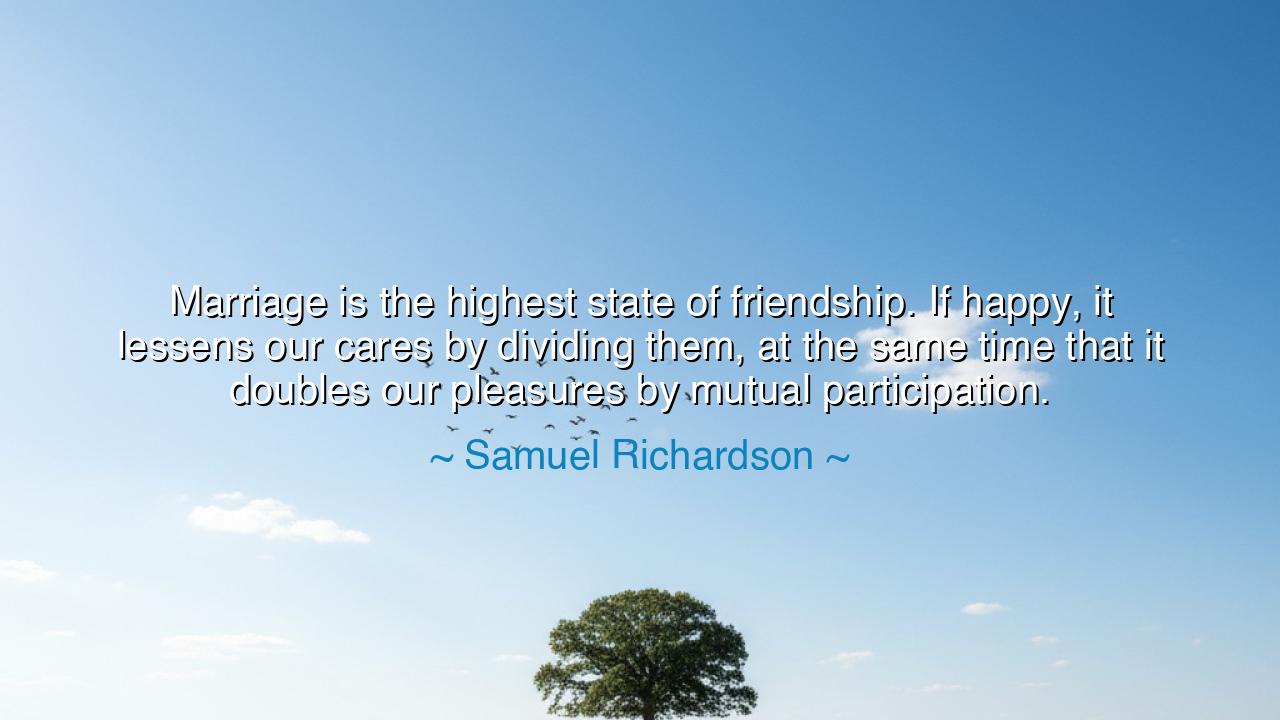
Marriage is the highest state of friendship. If happy, it lessens
Marriage is the highest state of friendship. If happy, it lessens our cares by dividing them, at the same time that it doubles our pleasures by mutual participation.






In the tender and wise words of Samuel Richardson, the great novelist and moral philosopher of the eighteenth century, we hear an echo of one of life’s deepest truths: “Marriage is the highest state of friendship. If happy, it lessens our cares by dividing them, at the same time that it doubles our pleasures by mutual participation.” Here, Richardson speaks not merely of marriage as a social contract, but of a spiritual union — the joining of two souls who walk the path of life together, sharing both its sorrows and its joys. He reminds us that at its purest, marriage is not about possession or passion alone, but about friendship — that sacred bond founded on trust, respect, and mutual devotion.
In saying that marriage is the highest state of friendship, Richardson elevates companionship above all other bonds. For friendship is born not of fleeting emotion, but of understanding and affection that has been tried by time. It is the meeting of minds, the communion of hearts, the quiet harmony that exists when two souls see in each other not perfection, but acceptance. Marriage, he tells us, is friendship perfected — because in it, two lives become intertwined so completely that one cannot rise or fall without touching the other. It is the most intimate form of alliance, where friendship deepens into devotion, and devotion ripens into love that endures all seasons.
The next part of his wisdom — that a happy marriage lessens our cares by dividing them — is the very essence of partnership. Life’s burdens, when borne alone, weigh heavily on the spirit. But when two share them together, their weight grows lighter, for love transforms hardship into shared strength. As the ancients said, “Grief shared is halved; joy shared is doubled.” In a true marriage, neither partner walks alone in adversity — each becomes the other’s refuge, the other’s shield. Thus, the storms that would destroy one are softened by the shelter of two. Richardson understood that even in an age of reason and restraint, there is no greater comfort than the companionship of a faithful heart.
Yet, Richardson’s insight deepens further when he says that marriage doubles our pleasures by mutual participation. What is joy, if not magnified by the presence of another? To laugh together, to witness the world through another’s eyes, to see one’s own happiness reflected in a beloved face — this is the alchemy that turns simple pleasures into immortal memories. In the solitude of self, joy is but a spark; in the communion of love, it becomes a flame. And thus, the mutual participation of marriage transforms the ordinary into the divine — a shared meal becomes a feast, a shared sunrise a miracle, a shared dream a destiny fulfilled.
The origin of these words lies in the heart and art of Richardson himself. Living in an age when marriage was often treated as transaction rather than union, he sought through his novels — especially Pamela and Clarissa — to remind society that marriage, if it is to be true, must be founded on virtue and friendship, not on wealth or convenience. His words emerged from a belief that love is not blind infatuation, but enlightened companionship. A marriage rooted in friendship, he argued, endures beyond passion, beyond beauty, even beyond time, because it is built upon the pillars of respect, honesty, and shared purpose.
History gives us many noble examples of this truth. Consider the union of Marcus Aurelius, the philosopher-emperor of Rome, and his wife Faustina. Though history remembers Marcus for his stoic wisdom, he was also a man of profound affection. In his Meditations, he writes of his wife with gratitude — for her patience, her loyalty, her laughter. Their marriage was not one of grandeur, but of companionship; she was his mirror, his anchor, and his solace amid empire’s burdens. Through her presence, his philosophy found its gentleness, his duty its joy. Their love, tested by war and loss, remained constant, proving that even the mightiest of men are sustained not by glory, but by the quiet strength of friendship in marriage.
From this teaching, we draw a lesson that transcends time: love that is not rooted in friendship cannot endure, but friendship that flowers into love becomes eternal. If one seeks happiness in marriage, one must seek first to understand, to listen, and to share — to make the cares of one the cares of both, and the joy of one the joy of both. In this way, marriage becomes not a chain, but a covenant — a sacred exchange of trust and tenderness that no hardship can destroy.
So, dear listener, let these words of Samuel Richardson be a guide for all who love, and all who hope to love. In your union, seek friendship first — for beauty fades, fortune shifts, and passion cools, but friendship endures. Divide your sorrows with gentleness, share your pleasures with gratitude, and let every moment be a testament to mutual care. For when two hearts walk as one, their burdens lighten, their joys expand, and their souls grow strong together — and thus, in this highest state of friendship, they find not only happiness, but the reflection of heaven itself.






AAdministratorAdministrator
Welcome, honored guests. Please leave a comment, we will respond soon